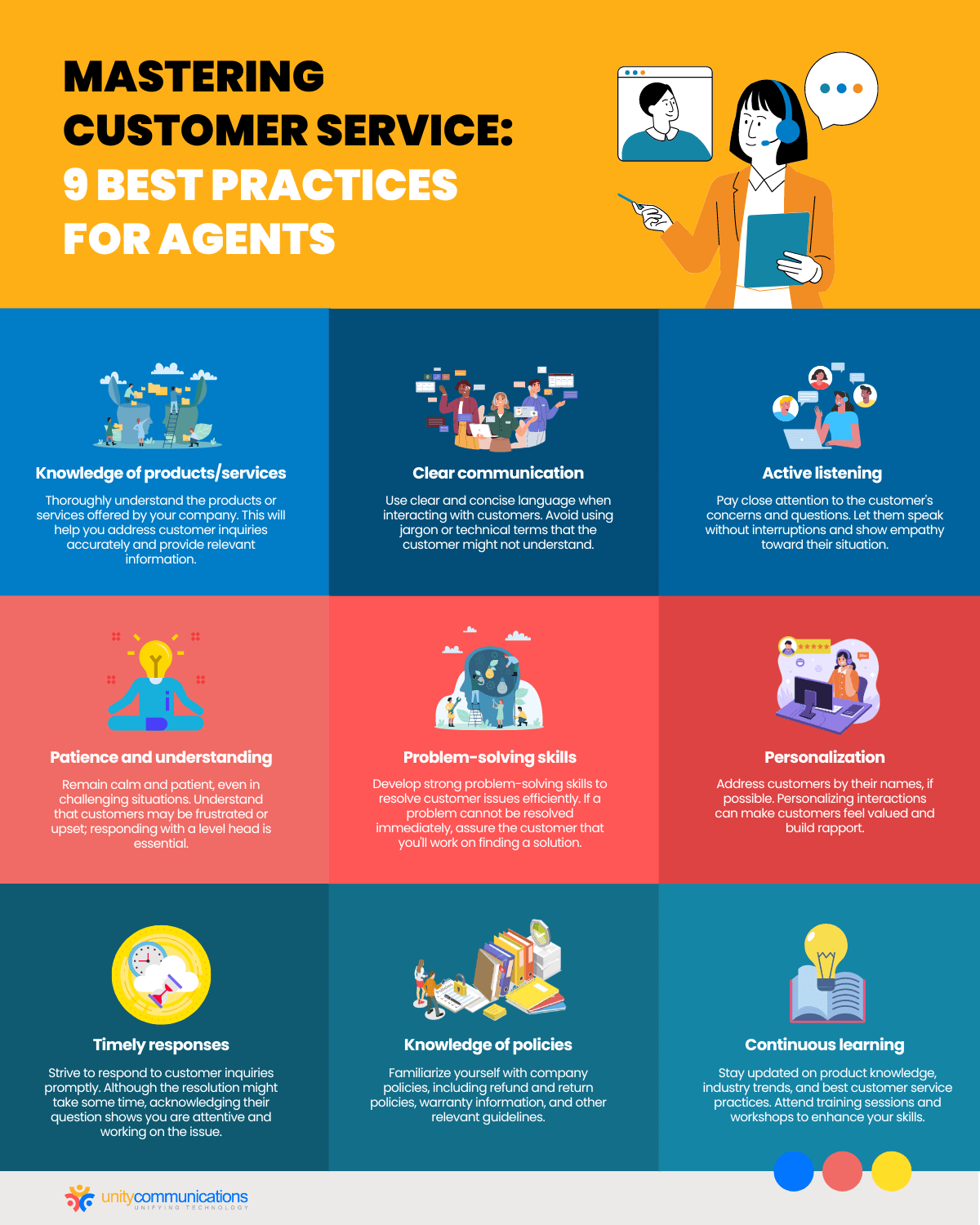IN THIS ARTICLE
Table of Contents
What are consumer support agents, and what is their role in business process outsourcing (BPO)? Buyers rely on these representatives for quick responses, no matter how small or big their concerns are regarding their purchases.
Due to steadily increasing demand, customer care BPO continues to expand. In 2022 alone, the sector will reach a market value of $22.6 billion.
But do you ever wonder what being a customer service representative is like? How do they spend their day quickly and effectively addressing requests? Do they follow specific procedures to deliver a top-notch customer experience?
Let us find out through this article.
How a Customer Service Representative’s Day Begins

Whether at home or within the office, the typical day of a customer service representative commences with preparations for their work tasks and activating their desktop systems. Some even engage in vocal warm-ups and physical stretching routines in anticipation of an eight-hour shift dedicated to assisting diverse customers.
Irrespective of varying time zones, support agents share a singular objective—to ensure the satisfaction of consumers. They regularly undergo training to adeptly perform the following customer service representative responsibilities:
- Addressing inquiries pertaining to company products and services.
- Resolving complaints related to damaged goods or subpar service offerings.
- Handling the processing of orders, payments, and shipments.
- Scheduling appointments.
- Managing and updating customer accounts, as well as aiding in their recovery.
- Managing refund requests, returns, and exchanges.
- Attending to billing and invoice inquiries.
- Maintaining comprehensive records of customer interactions.
- Promoting a variety of products.
- Conducting market research and surveys.
While some companies employ these professionals in-house, the majority opt to outsource their services for increased cost efficiency. Outsourced customer service representatives’ scalability, flexibility, and specialized skill sets enable client organizations to concentrate on their core functions without unnecessary expenditure.
As such, the global customer care BPO market constantly grows. According to Insight Partners, the sector was valued at $22.6 billion in 2022 alone. The research firm expects the industry to reach $34.6 billion by 2028 at a compound annual growth rate (CAGR) of nearly 8%.
Best Practices Customer Service Representative Must Follow

Support agents adhere to crucial guidelines and quality standards to ensure consumer satisfaction and retention. BPO companies draft these rules and regulations based on business strategies, industry policies, and government laws.
Here are some best practices that reliable BPO agents must follow:
Deeply Understand Client Products and Services
Consumer support agents undergo formal training and use knowledge resources to understand client products and services. They also participate in collaborative and continuous learning programs to familiarize themselves with the brand.
BPO providers host comprehensive training activities such as workshops, presentations, video tutorials, or interactive sessions. Such programs tackle crucial data regarding the client’s business offerings. Instructors help agents understand the client’s product features, specifications, usage instructions, and related details to address customer concerns well.
To fill the gap of missed training schedules, BPO companies ensure their customer care executives have access to an updated knowledge base of client-specific information. The repository includes the details below, so agents can easily review them before, during, and after customer interactions.
- Product guides
- Frequently Asked Questions (FAQs)
- Troubleshooting steps
- Preset dialogue
- Service manuals
Ensure Effective Oral and Written Communication
BPO customer service personnel take several steps to ensure effective oral and written communication. Service providers implement the following strategies to help agents clearly and naturally interact with customers:
- Language assessments are part of pre-screening tests. They identify a customer service representative’s language proficiency. This step is crucial to confirm whether applicants can smoothly engage with customers using English and other relevant languages before accepting and deploying them.
- Accent and pronunciation training ensures agents can talk with customers using clear, neutral accents, building rapport and avoiding misunderstandings.
- Non-voice communication training teaches team members how to appropriately engage with consumers through email, chat, or social media. It highlights ways to properly use grammar and formatting to ensure brief and concise written responses.
Apply Customer Service Etiquette
Because customer service involves dealing with different people, agents follow call and contact center etiquette. This practice ensures they maintain a professional attitude, especially when encountering frustrated and rude consumers.
Besides, support agents value keeping customers satisfied and loyal to a brand. They receive competitive compensation and benefits and do their best to help retain consumers and achieve business success. Plus, they know they will likely lose buyers to competitors after a bad experience, as confirmed by 61% of Zendesk’s polled customers.
BPO companies thus make sure their customer service representatives exercise the following work etiquette:
- Actively listen to and comprehend every word customers say
- Patiently help identify the root cause of customer problems
- Carefully explain the step-by-step process for resolving issues
- Communicate with consumers clearly and calmly
- Comply with on-hold rules during live chats or calls with customers
- Address background noise, especially when working at home
- Respond to missed inbound calls, emails, and chats
- Detail the processes involved when resolving unexpected errors
- Handle consumer information responsibly and with respect to privacy
- Get feedback after customer interactions to identify areas of improvement
Study Problem Resolution Techniques
Resolving issues is one of the most critical duties of a customer service representative. So agents study strategies on how to deliver effective problem solutions. They use the following approaches to practice resolving simple or complex issues:
- Access digital or physical documents that detail troubleshooting guides
- Conform to escalation policies and procedures for complicated customer problems
- Learn about case studies highlighting challenging customer issues and resolutions
- Take continuous learning programs focused on specific problem-solving strategies
- Seek guidance from subject-matter experts or team leaders within their company
- Review data and privacy security rules to ensure compliance
Use Scripts and Appropriate Technologies
Besides training and document review, support agents use scripts and appropriate technologies to streamline tasks. These resources help them deliver a superior-quality customer experience. Such tools help provide consistent and accurate responses.
- Call and live chat scripts are pre-written guidelines that include proper greetings, recommended answers, probing questions, and steps for issue resolution.
- Email templates ensure professional and well-structured responses to customer inquiries sent via email.
- Customer relationship management (CRM) systems facilitate the management of customer engagement, data collection, and request tracking activities.
- Automatic call distribution and ticketing solutions gather, organize, and monitor customer inquiries and route them to appropriate customer service representatives.
- Artificial intelligence (AI) platforms automate and simplify repetitive tasks and responses.
- Cloud solutions such as contact center as a service (CCaaS) help safely store data and ensure smooth communication across integrated channels.
- Speech and data analytics tools allow support agents to identify and observe changing consumer preferences and industry trends for further service enhancement.
Prioritize Personalized Customer Experience

Those advanced tools and scripts let call, and contact center agents prioritize a personalized customer experience. The resources enable them to deliver immediate responses through customers’ preferred channels.
In addition to such platforms, support agents execute various ways to personalize the customer journey:
- Address consumers by their names during greetings and interactions
- Adjust communication tone and style based on particular situations
- Take note of a customer’s history and account information
- Express empathy and understanding when listening to customer concerns
- Provide customized recommendations based on consumers’ specific needs
- Engage in friendly and conversational dialogue while addressing inquiries
- Follow up or deliver updates to ensure comprehensive problem resolutions
By using such strategies, agents help boost customer satisfaction and retention. Twilio proved that fact in its latest report. The cloud communication platform provider found that 86% of surveyed consumers have become increasingly loyal to specific brands due to personalized experiences.
Adhere to Project Turnaround Time
Customer service representatives ensure compliance with project turnaround schedules by giving precedence to essential and time-critical assignments. They employ productivity methodologies like time blocking and utilize automated task distribution software to efficiently manage their time.
Furthermore, agents adhere to standardized workflows that outline the sequential stages of addressing customer inquiries and delivering solutions. These structured procedures contribute to maintaining uniformity and preventing any undue delays.
Undergo Regular Assessment
To further improve work performance, BPO agents undergo regular assessments, both monthly and yearly. Service providers use multiple methods to evaluate their productivity and provide feedback. The resulting insights help identify ways to improve the staff’s skills and efficiency. Here are the common practices agents encounter when being evaluated:
- Output quality monitoring
- Key performance indicator (KPI) assessments
- Customer feedback-driven evaluation
- Coaching and training
- Self-assessment
- Team and peer evaluation
- Automated performance tracking
Comply with Security Policies and Procedures
Well-grounded support agents comply with security policies and procedures. When exploring what BPO is, ensuring that these third-party workers follow such rules is crucial. It gives clients confidence that the BPO team can protect customer and business data against external threats. BPO agents ensure adherence to standard security rules through these measures:
- Undergo regular security training and compliance analysis
- Review data privacy laws and regulations
- Follow strict access controls and authentication procedures
- Sign and obey confidentiality agreements
- Learn to use secure channels such as virtual private networks (VPNs)
- Identify and promptly report any security incidents and data breaches
- Exercise clean desk and secure workstation policies
The Bottom Line
Third-party customer service representatives are vital to keeping consumers satisfied and loyal to a brand. The agents’ way of responding to inquiries and resolving issues influences how customers perceive and trust a business.
Like other professionals, BPO agents undergo training and follow relevant procedures to ensure an unmatched customer experience. Various guidelines and tools help these specialists meet evolving consumer demands.
Do you want to hire highly trained and committed customer support agents? Drop a line, and let’s connect. Unity Communications employs skilled and flexible workers ready to satisfy customer needs.





